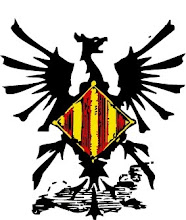THE GESTAPO PAPERS, by Josep C. Vergés
published in Diari de Girona, 12.12.2004
My father Josep Verges Matas, publisher of Destino, who was very well informed, told me that the violent disagreement in the Hendaia train with Hitler ("Franco is worse than a visit to the dentist") was not the hardly credible carving up of Africa, but the Final Solution of the Catalans
The Gestapo Sicherheitsdienst, the spies of Adolf Hitler's political police, set up in 1937 the operation known as the Salamanca Papers, 200,000 kilos of documents stolen from Catalans and kept in the orphanage of Gibraltar Street in Francisco Franco's. headquarters. The dictator's historian Paul Preston has uncovered that SS colonel Heinz Jost, sentenced to death in Nuremberg, designed this racial cleansing of Spain. My father Josep Verges Matas, publisher of Destino, who was very well informed, told me that the violent disagreement in the Hendaia train with Hitler ("Franco is worse than a visit to the dentist") was not the hardly credible carving up of Africa, but the Final Solution of the Catalans. The Führer baulked at deporting all of us as the blood price of his ally for entering the War. One thing is the disappearance of the dispersed Jews of the III Reich and another, Imaginary Jews in their own land. Crimes must be kept hidden like the bloody persecution set up by the Gestapo. Three million Catalans, every single one, was on police file. Brother in law Ramon Serrano Sunyer entrusted the looting to friend of the family Marcelino Ulibarri. Later he presided the Repression Tribunal, in charge of death sentences. Just in Camp de la Bota, today covered by the Speculators' Forum, 1,400 were shot. Anything not carted off was destroyed, like books and magazines in Catalan. But these were not burnt as in Germany, rather made into paper paste, which is more profitable. The magnificent Plaza Mayor of Salamanca is also built with war plunder from the destruction of Catalonia in 1714.
The archive designed by the Gestapo in Salamanca comprised 17 (of 50) provinces which fought against fascism. But Spaniards have recovered their documents, like the families of politicians Giner de los Rios and Azaña. In contrast the Catalan families of Cambo and Rovira i Virgili received just lies as an answer. The Dignity Commission says in a book (Publishers Milenio) that hiding the contents and making a police file into an archive is a dishonest ploy to gain time and not return documents which were obtained through violence. The first culture minister after Franco Ricardo de la Cierva warned that returning the Salamanca Papers to the Catalans would break up Spain, as Jose Maria Aznar repeats: "The Spanish nation itself is in danger."
The Dignity coordinator Toni Strubell asks: "Matthausen and Dachau are kept as reminders of the holocaust. What would be hard to understand is keeping some Jews in huts for Unity of the Jewish Archive. It is unthinkable that documents stolen by the Nazis during the war have not been returned. If Salamanca is the Civil War Archive, why does it only have the documents of a minority? There was no Civil War in the rest of Spain? Why not take there the enormous collections held in at least six Spanish archives? Not forgetting the highly subsidised Francisco Franco Foundation. If minister of defence Jose Bono has been able to return to Russia the holy orthodox cross plundered by the Division Azul, why cannot Catalans have returned what belongs to us? In the Rule of Law all stolen goods are returned to their owners."
500 intellectuals and famous people like presidents Mario Soares and Francesco Cossiga have asked for their return. Hispanist Henry Ettinghausen writes: "It is the deliberate perpetuation of a State of armed robbery. Doing nothing is not a neutral decision, rather maintains collective amnesia and rules out remedying one of the very few disasters of the Civil War that can still be remedied." PSOE, in mixed marriage with PSC and dependant on Esquerra, will be just as guilty as PP if they do not return the Gestapo Papers in Salamanca, capital of the Civil War and, it seems, European capital of culture.



0 Comments:
Publica un comentari a l'entrada
<< Home